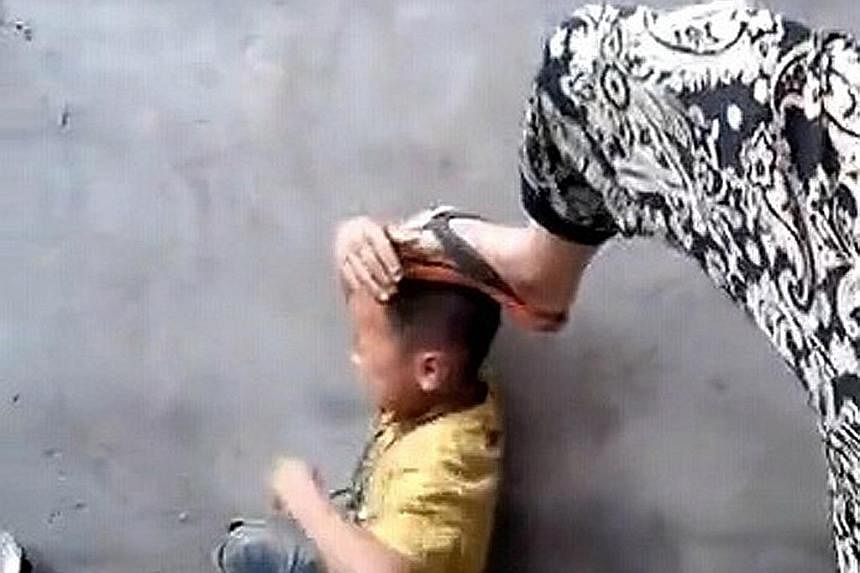The room was locked so he could not escape from his attackers, who had tied a rope around his neck.
Afraid and in tears, the eight-year-old pleaded with the four teenage boys, who showed no mercy and began assaulting him.
A video of the vicious attack went viral after it was posted online last Sunday, triggering concerns over youth violence and bullying in China.
The clip, which lasts just over two minutes, shows the bigger boys slapping and kicking their victim, and stepping on his head and ankle as he groans. The beating did not stop there. They also burned him with cigarettes that they threw under the boy's T-shirt.
"I won't dare do it any more," cried the boy at one point, before he was promptly hit with a stick.
The incident, which took place last month in coastal Zhejiang province, is believed to be a revenge attack, according to media reports. The victim's father had rebuked the older boys for involving his young son in their shoplifting attempt.
Police found the culprits and made them apologise to the boy and his family. It is said the families of the four teens offered 90,000 yuan (S$19,500) in compensation.
Youth violence and bullying in school, long a problem in China, appear to be worsening, going by the number of videos of such incidents posted online. Chinese media reported at least 20 cases of youth violence this year.
A video that has gone viral since last Monday shows five young girls in Yongxin county, central Jiangxi province, slapping and kicking a kneeling teenage girl. They also hit her head repeatedly with slippers and water bottles.
Last month, two 17-year-old girls, one of them pregnant, were captured on video slapping and kicking a 16-year-old girl.
These incidents worry parents, especially those with young children, like Beijing resident Luo Xiaoping, 38.
Ms Luo said she checks up on her 10-year-old daughter more often, ever since she was bullied at school. Two years ago, a boy in her daughter's class jabbed her head with a pencil, leaving two wounds that Ms Luo discovered one day later because the child was too scared and traumatised to talk.
"I'm concerned as society these days is quite messy and no one knows what might happen in school. Many kids are spoilt by their parents and act recklessly if things don't go their way," Ms Luo told The Sunday Times.
A study by the China Youth and Children Research Centre conducted in 12 provinces found that the crime rate of 14-year-olds had jumped from 12.3 per cent in 2001 to 20.1 per cent last year.
Child protection expert Tong Xiaojun of the China Youth University for Political Sciences said the issue of youth violence is gaining more public attention because of the increasing use of smartphones and social media among the younger generation.
"It shows that young people may not realise their actions violate the law. Also, they could be trying to show off by posting the videos online," Dr Tong told The Sunday Times.
The spate of incidents this year has led to soul-searching among many people over the adequacy of moral education for China's youth, and also intensified a public debate among child protection experts on how to curb this worrying phenomenon.
-
A study by the China
Youth and Children
Research Centre
conducted in 12
provinces found that
the crime rate of
14-year-olds had
jumped from 12.3 per
cent in 2001 to 20.1
per cent last year.
Observers cite a lack of proper guidance from teachers and family, the influence of films and television shows, and feelings of being marginalised as key factors behind rising teen violence.
Lenient punishment is also a reason, the Global Times last Friday reported Dr Zhang Kaixuan, an expert from the Beijing Youth Legal and Psychological Consultation Service Centre, as saying.
Under the 1991 Child Protection Law, those below the age of 14 do not face criminal prosecution while those between 14 and 16 are spared criminal punishment except for serious crimes such as murder, rape and arson.
Those who commit lesser offences may be taken into custody for rehabilitation - such as a juvenile reformatory or work-study school.
"Teenagers pay a small price for their violent acts under current regulations, and the light punishment they receive may encourage further violent behaviour," said Dr Zhang.
While many feel there may be a need for stiffer punishment, Dr Tong believes a better long-term remedy is to have a system of youth-oriented public services, which is now lacking in China.
Ms Zhou Jingjie, who runs a female dormitory for senior high school students in Inner Mongolia, also believes that tougher punishment may not solve the problem.
"Disputes between students are inevitable and harsh punishment may deepen the rift. It is better to look out for warning signs and educate them on ways to resolve disputes," she said.




